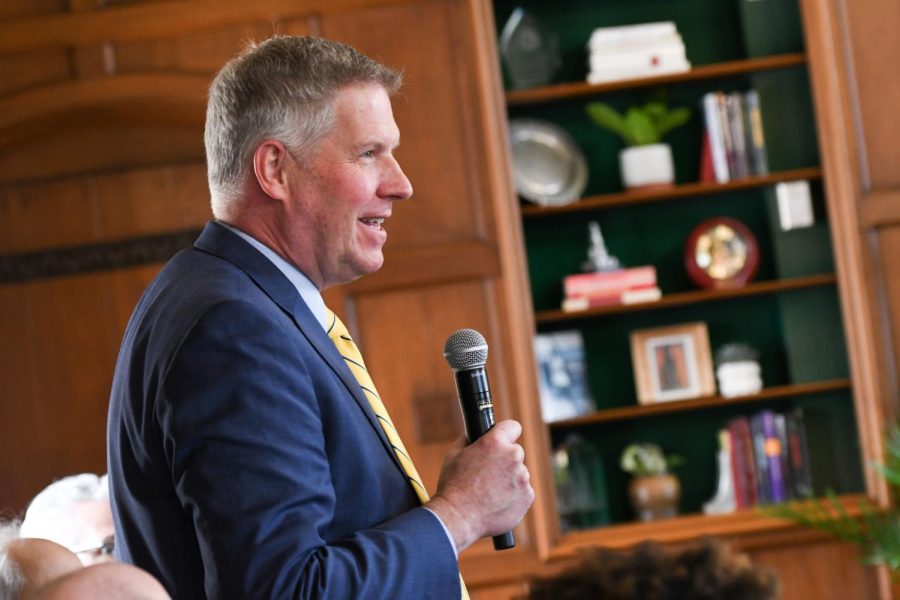Chancellor Gallagher weighs in on the year of protests, gives advice for the future
Pamela Smith | Contributing Editor
Chancellor Patrick Gallagher speaks at a press conference following the appointment of Joan Gabel as the University’s next chancellor.
May 16, 2023
As his nearly decade-long tenure as chancellor comes to a close, Chancellor Patrick Gallagher said he admits there have been many mistakes, but he hopes each mistake serves as a “teachable moment” and that the Pitt community continues to “learn” from them.
“I’m sure that we have made mistakes, any human organization will,” Gallagher said. “I hope I was humble enough to own those mistakes when we made them. The ones that you tend to regret the most were the ones that happened that you were blind to because those were causing problems, or causing pain or hurt in ways that you didn’t understand.”
Reflecting on the numerous protests during the year
During the past academic year there have been a number of protests on campus, including the protest against sexual assault, the die-in, faculty union protests and the protests against anti-trans speakers.
Galllagher noted that the presence of protests on campus is a sign of students exercising their rights and said he views the protests as a way for students to provide “input” to the University and gives students “a sense of having agency.”
“So I think we all want to learn about how we participate in a time when protests are going to be more common,” Gallagher said. “Every right and privilege comes with a responsibility, so what are our responsibilities to do it correctly and to look after each other? I think there’s some teachable moments here that I hope the university will embrace, but we absolutely should always welcome and protect and defend our ability to speak and express ourselves.”
Gallagher did express concerns about speech, including protests, that fall into the category of being “confrontational,” such as those that focus more on “shutting down somebody else’s rights to free speech.”
“It shouldn’t be the case that one viewpoint can out-shout or outmaneuver or cancel the other,” Gallagher said. “And that has been of concern to me that some have defined the success of these efforts in that context, rather than expressing a point of view and seeking support for that point of view.”
Gallagher said in some cases, he believes the demands from some protests have been met, and in other cases there are still “long-standing issues” — like the protest against sexual assaults on campus — that are still being worked on.
“I will tell you that not every demand and list is compatible with every other demand list. So I’m sure in the end, coming up with a reasonable agenda that we work on, somebody may feel that it’s not entirely responsive to what they want and they continue to raise that with us.”
Gallagher added he expects a continued list of demands from the Pitt community, stating “candidly, we haven’t done enough.”
Gallagher also attributed some of the recent rise in protests and frustrations from the student body to the previous years during the COVID-19 pandemic, where students weren’t as aware of what was being done by the University for certain issues.
“I think a lot of the awareness and momentum we had around some of these efforts was lost,” Gallagher said. “So part of what happened I think, is a kind of a ‘hey, you know, this problem is still there,’ and a lot of our students haven’t shown up on campus since we last were focused on this, and they simply don’t know what’s happening.”
For Gallagher, there is a positive side, stating the exercise of free speech is supported and is helping to improve Pitt, even if it takes time to remedy the issues.
“I will say, you have to look at this with the positive side, these protests and these demands, and all about making Pitt better,” Gallagher said. “It was about improving and that’s a great thing, and I wish we could snap our fingers and sort of instantly gratify all of these concerns, but sometimes, it’s harder than that.”
Thoughts on the New Chancellor
Gallagher said incoming chancellor Joan Gabel is a “seasoned university president” and will be familiar with dealing with many of the issues Pitt faces using her experience in Minnesota.
“I think, where I can be most helpful to her is not telling her what to do, but sharing with her some of the things that have been specifically related to Pitt where her experience in Minnesota may not be as helpful. Or where there are things underway that I think are important, and that I hope continue to get support under the leadership.”
Gallagher said he is “supportive” of the announced salary of incoming Chancellor Gabel, whose salary will be a 36% increase from Gallagher’s salary. Gallagher also added he believed the University treated him “more than fairly,” and he never asked for a raise.
“I think the university did the right thing, by looking at the market, if you want to attract a great person here you want to be competitive, and I think that’s where that comes from,” Gallagher said. “And I think they did that when they hired me nine years ago and they did it now when they hired Joan Gabel.”
Advice for the future
Gallagher said his proudest moment during his tenure has been watching the Pitt community come together when facing the “unknown.”
“In the end, it might have been a bit rocky at the beginning on a certain issue, there might have been a lot of protesting and demands, but in the end, you know, we get together and we solve it and that’s been the magic.”
Gallagher’s final parting advice for Pitt students — following your values.
“When you’re dealing with something that has no playbook, doing it for the right reasons is the only way you’re going to get to the right answer,” Gallagher said.



